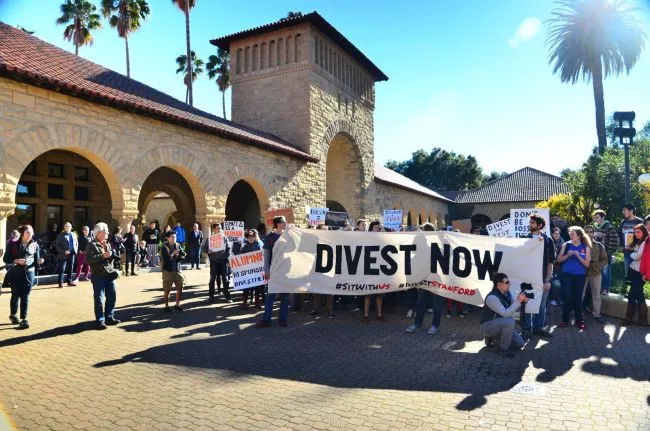Table of Contents
Fossil Free Stanford (FFS) has spent the last three years taking countless public actions to sever the university’s financial investments in the fossil fuel industry. Many no doubt remember their successful 2014 campaign to divest from coal, as well as their ultimately fruitless efforts to divest from the oil and gas industry last year. Over this period, the Review argued at several points that FFS efforts were ineffectual and counterproductive.
At a Senate meeting this week, FFS put forth yet another flawed initiative for fossil fuel divestment. They have asked for a timeline and economic and ethical analysis of divestment from the Stanford Student Enterprises (SSE) Board of Directors. They intend to use that information in shaping a future proposal to divest ASSU funds from fossil fuels.
Their initiative also called for public comment. I am happy to oblige them.
Before we even discuss the merits of divestment, it is important to understand that this bill is different from past campaigns because it does not make a request of Stanford — but instead SSE, an ASSU entity which the Senate technically controls. The first question to ask, therefore, is whether SSE is in a position to focus on divestment. Unfortunately, the organization simply does not have the bandwidth, track record, or analytical skill to make any kind of reliable judgement about this proposal.
Just last spring, the SSE was rocked by a series of scandals after their CEO Frederik Groce hired his girlfriend at an annual salary of $70,000 without SSE approval. The Chairman of the Board, Ateeq Suria, also demonstrated multiple conflicts of interest after failing to report Groce’s personal situation and attempting to replace him with a close friend.
Has SSE improved from this perilous position? Given that the SSE-managed Student Store has plummeted in profitability, there are doubts. Little has been done to fix the fact that the store operates on an honor system. They have no way to ensure that the store is opened at the proper times, to know what merchandise has been sold, to be sure all items were sold at the proper price, or even that daily revenue is properly accounted for. SSE’s board has also not been able to enforce the performance metrics set for their own staff.
Perhaps this is why the Store — despite paying zero rent — is still in the red. An organization that can’t reliably manage a Stanford memorabilia gift shop surely can’t be trusted to develop a complex financial plan for the millions of dollars in the ASSU budget.
Even if we consider the question of divestment in the abstract, though, the Stanford administration decided not to divest last year. They conducted their own analysis on the economic viability of divestment and decided that the financial consequences were too severe, given a lack of viable alternatives. They explained that they have an obligation to preserve the university’s endowment to ensure its promise of financial support for the student body. The administration wisely committed to developing alternative energy resources, but also acknowledged the reality that the endowment would suffer as a result of divestment.
And that reality is incontrovertible. The economics of divestment prevent it from actually creating the change that Fossil Free Stanford hopes to accomplish. If anything, divestment distracts us from real solutions like investing in alternative energy. FFS would be more effective in achieving its goals by advocating new commitments to clean and renewable energy sources rather than their current, worn, tactic of demanding unfeasible divestment.
FFS, like many other campus groups, correctly identifies a problem but fails to provide effective solutions. Divestment simply does not work. Historical experience and economics prove as much. The administration’s recent rejection of divestment was based on a careful observation of these facts. Seeking approval and guidance from the SSE, an organization that has failed to make a clean break from its corrupt and grossly mismanaged past, only serves to deride and derail the necessary conversation that needs to be had about addressing climate change.
Fossil Free Stanford could be a great force for good on this campus if they focused on effective and achievable policies. Instead, they have chosen — again — to beat the same broken drum.





